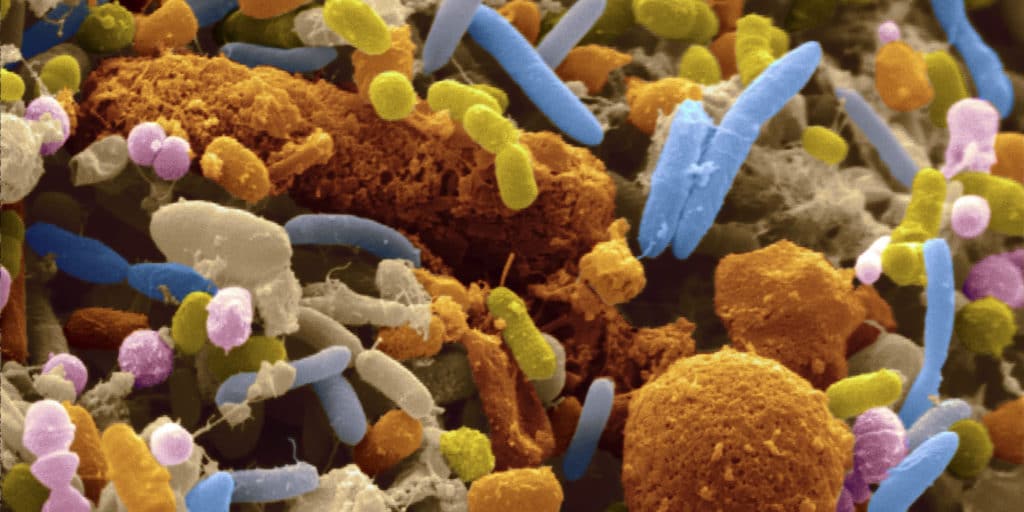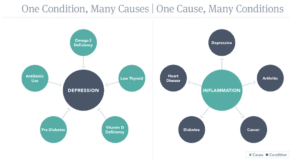“My digestion feels great. It’s working just fine.”
That’s what my client Lana told me in our first appointment together when I asked her about possible digestive symptoms. Even when I asked more probing questions, she didn’t report anything abnormal about her gut.
BUT, she was wiped!
Her energy sucked, and she felt completely unmotivated every morning.
And guess what? When she got some labs done, she had a SIBO overgrowth, which stands for Small Intestine Bacterial Overgrowth. And to confirm that this was at the root of her energy problems, within a month of her treating her SIBO, she started feeling better.
““All disease begins in the gut.”
Hippocrates said this over 2000 years ago, but only recently are we starting to understand what he meant…
We’re learning more and more that Hippocrates knew what he was talking about…
Our gut is home to tons of bacteria. There’s actually 39 trillion bacterial cells on your body. Now, if you think about the fact that you have around 30 trillion cells, stop and take a look in the mirror.
Holy cow, Mama! You can’t see it, but you’re more bacteria than human cells.
These bacteria play a multitude of roles in our health. Nature is so smart, so it put all that bacteria there for a reason. Understanding the role these critical organisms play may be the key to unlocking why your energy and mood seem to have a life of their own.
Our gut flora protect us from infection, regulate our metabolism, promote normal GI function, and more….
Dysregulated gut flora has been linked to many diseases including depression, IBS, chronic fatigue syndrome, bacterial vaginosis, Hashimoto’s hypothyroid disease, and more.
Usually when the gut flora is dysregulated (which is called dysbiosis), the gut lining has been damaged as well. This can lead to more problems, like food sensitivities or allergies, inflammation, autoimmune disease, just to name a few. It can also give you some terrible brain fog!!
We’re going to dig into to some of the things that can go wrong in the gut. All of these issues either negatively affect the gut bacteria, OR they are a direct issues of the gut bacteria being out of wack.
If you’d like to dig into this by watching a video, you can watch it here, or read on below!
https://www.youtube.com/watch?v=57K_quZYKXQ
1. Low Stomach Acid
Your stomach is supposed to be very acidic. This helps you break down protein, and absorb minerals. It also kills bacteria that makes its way into the mouth, and stops it from getting into the gut. Let’s say you go out to eat, and there’s a small amount of problematic bacteria in your steak. I know, gross… But you have no idea, so you chow that steak down. One of the first major lines of defense to that bacteria is your stomach acid. But, let’s say it’s low, and that bacteria heads on through the stomach and into the intestines.
Now, it’s up to your immune system to deal with the bacteria. There’s more of a chance that this bacteria could negatively affect you, and perhaps cause you to get sick, than if it had been dealt with right away by sufficient stomach acid.
Be aware that low stomach acid is implicated in many cases of acid reflux problems as well, so this is something to consider if you also suffer from heartburn.
2. SIBO
As I mentioned above this is what Lana had that was severely impacting her energy. Typically with SIBO, my clients have bloating, gas, and suffer from diarrhea or constipation.
SIBO can be caused by food poisoning, low stomach acid, Celiac Disease, and is associated with a long and growing list of diseases and conditions. Some of those include allergies and intolerances, mood disorders, and metabolic disorders. Interestingly 84% of patients diagnosed with IBS have been shown to have a positive SIBO breath test.
SIBO can play a role in all of the following conditions, so if you have any of these, it’s worth looking into:
- Autoimmunity
- Restless Leg Syndrome
- Rosacea
- Hormone imbalance
- Leaky Gut
- Weight gain or loss
- Food Sensitivities
Lana was pretty surprised when she found out she had a SIBO overgrowth, but what a relief it was when she started waking up ready to start her day!
3. Imbalanced gut flora (dysbiosis)
If bacteria in the gut is out of balance, it’s called dysbiosis. There are a lot of strains of bacteria that live in the gut. It’s important that there are enough good guys to keep the bad guys in check.
Imagine you go to a concert. There are people there to enjoy the music, dance, and have a good time, and security guards to help everyone do just that. Then, there are some people that show up having thrown back one (or 5 too many) and they are out of control; fighting and damaging property. The third group is a bunch of people that started out seeming calm, but when they see the rowdy crew, they decide they’re going to get rowdy too!
Think of the happy concert attendees and the security guards as the beneficial bacteria. If there are enough of them at the concert, than the rowdy ones will be kept in check, and the whole crowd will be safe.
The rowdy ones are the pathogenic bacteria. The others that join in with them are opportunistic bacteria. They only start creating problems if given the opportunity.
This is exactly how things operate in the gut. There’s always opportunistic & pathogenic strains that are in the gut, or that show up on occasion. If our beneficial bacteria are at sufficient levels, it will keep all the rest in check most of the time, and keep us healthy.
These are some of the things that can mess up bacteria:
- Poor diet
- Antibiotics
- Stress
- Lack of sleep
- Alcohol
- Environmental toxins
A comprehensive stool culture can look to see what’s going on with your gut buddies, and help you to keep the concert fun and enjoyable!
4. Parasites
Parasites are organisms that can take up residence in the gut. It can freak people out to think they might have a parasite, but the good news is that there are a lot of approaches for getting rid of them.
The same stool culture mentioned above for dysbiosis will also look for parasites. The tricky thing about parasites is that they can hide in a gut lining that is damaged. I’ve had clients whose stool tests came back negative for parasites. After implementing a diet to heal leaky gut, they re-tested, and boom! There was a parasite…
So, it’s always something to consider if you’ve tested in the past, but are still experiencing negative symptoms. Some common complaints of a person with a parasite are:
- Allergies
- IBS
- Diarrhea
- Leaky Gut
- Fatigue
- Anemia
5. Other bacterial Infections
H. Pylori is a bacteria that can live in the gut. Interestingly, it may play a protective role, so if this shows up on your labs, and you’re in great health with awesome energy, and no complaints, than it may be supporting your body in a good way.
However, it can also be very problematic. It can grow more easily when stomach acid is low, and acid suppressing drugs can increase the risk for H. Pylori infection. It’s also a leading cause of gastritis.
H. Pylori has been associated with some of the following conditions:
- Halitosis
- Rosacea
- Ulcers
- Stomach Cancer
- Leaky Gut
- Inflammation
You may have heard of C. dif as being a pretty nasty infection. It certainly can be awful and cause a person to get severe diarrhea and fatigue, among other problems. However, some people can get C. dif and only get mild diarrhea that disappears quickly, but they’re left with the toxins…
C. dif toxins typically cause bloating, diarrhea, and abdominal pain. However, there can be many seemingly unrelated symptoms like fatigue that disappear when this is treated.
6. Yeast overgrowth
Yeast, such as candida are normally occurring flora in the gut, but when they overgrow, they can cause a bunch of issues. Usually when yeast overgrows there are other problems going on in the gut or with the immune system.
If dysbiosis, SIBO, h.pylori, parasites, and a number of other issues are present, this might set the stage for yeast to overgrow.
A person with yeast overgrowth may crave sugar, feel tired, have food sensitivities, and have mood problems. Addressing the yeast can really help, but it’s also important to look for why the yeast overgrowth occurred, to fully resolve the issue.
I’ve watched people go on restrictive candida diets meant to ‘starve’ the yeast, and they often feel a bit better, but once they’re off the diet, they’re symptoms return. This is why it’s so important to get to the ROOT of your symptoms to reach your full healing and energy potential!
LOOK TO YOUR GUT!
Even when digestion seems fine, it’s always important to make sure that the gut is in tip-top shape so that you can get to feeling your best. After watching gut problems show up with clients like Lana, who had no gut symptoms, it’s taught me ALWAYS to consider gut health with any condition.
The beauty of this is that most of my clients find that when they do this, they see improvement in other aspects of health that they weren’t even trying to work on in the first place. This is when you know you’ve gotten to the ROOT of your symptoms….
When you see your whole body and mind improving…
If you have a gut feeling this could help, I hope this gives you some tools to start improving your energy!




